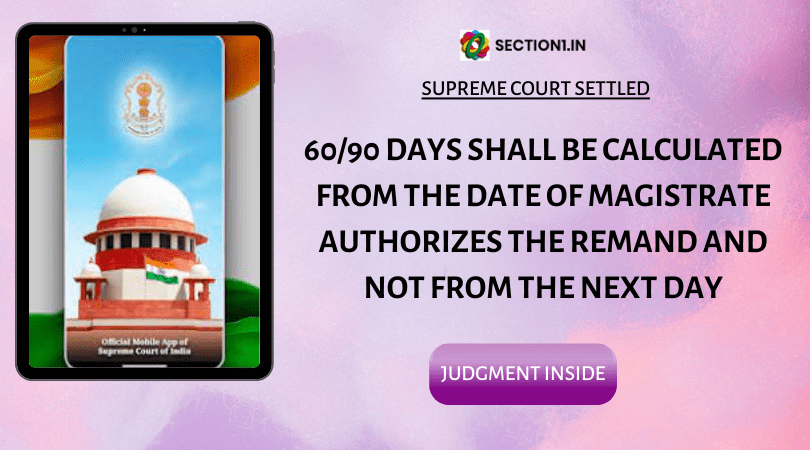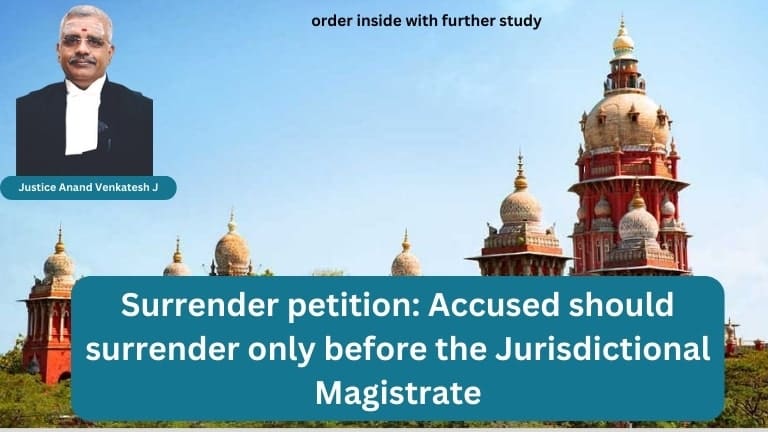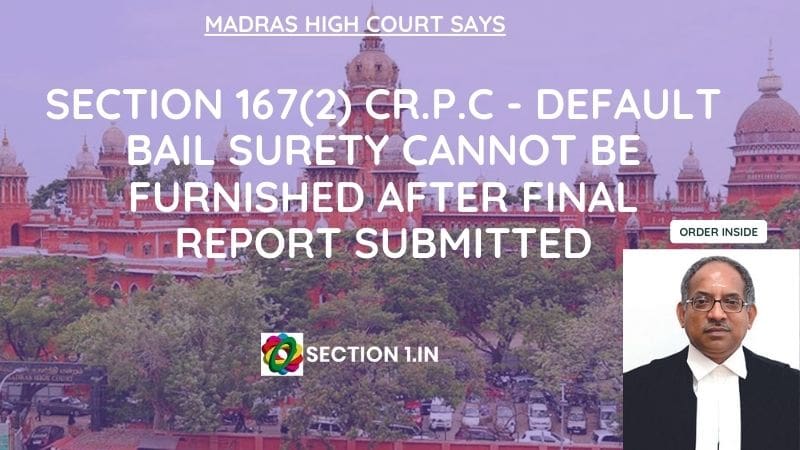2. In the present case, we discuss the rights of such accused, whose right to default bail, hangs in the balance by difference of a single day or even less. Ostensibly, one may presume this to be insignificant. However, the constitutional import of the matter is such, that personal liberty, which may only be taken away by a just and fair procedure established by law, needs to be analyzed and protected. The issue is simple to state but hard to answer. It is embedded in a maze of case law that this Court needs to negotiate. Simply put, the Court needs to answer whether the period of remand under the first proviso to Sec. 167 (2) of the Code of Criminal Procedure, 1973 (hereinafter ‘CrPC’) is inclusive of the day on which the Magistrate orders remand. Whatever be the outcome, this Court is conscious that none should suffer incarceration without legal authority. Although, the State is tasked to prevent crime and maintain security, personal liberty-should not be the collateral.
xxx
ISSUES AND REFERENCE
QUESTION OF LAW
6. The core issue that arises for consideration is whether the date of remand is to be included or excluded, for considering a claim for default bail, when computing the 60/90-day period as contemplated in proviso (a) of Section 167 (2) of the CrPC. The moot question has been considered by this Court in various cases, but there is a divergence of opinion on how the stipulated period, for the right of default bail, accruing to the accused, is to be computed. Some judgements have favoured the exclusion of date of remand, while a contrary view is taken in other cases.
COMPUTING THE DATE OF REMAND – EXCLUDE THE DATE OF REMAND
7. The prosecution relies, on the line of reasoning in State of M.P. Vs. Rustam & Ors – 1995 (Supp) 3 SCC 221, which was later followed in Ravi Prakash Singh Vs. State of Bihar – (2015) 8 SCC 340 and M. Ravindran Vs. Intelligence Officer, Director of Revenue Intelligence – (2021) 2 SCC 485, where it was held that the date of remand is to be excluded for computing the stipulated 60/90-day period, for the right of default bail, to arise.
COMPUTING THE DATE OF REMAND – INCLUDE THE DATE OF REMAND
8. On the other hand, the Accused rely, inter alia, on Chaganti Satyanarayan Vs. State of Andhra Pradesh – (1986) 3 SCC 141, CBI Vs. Anupam J Kulkarni – (1992) 3 SCC 141, State Vs. Mohd. Ashraft Bhat – (1996) 1 SCC 432 and State of Maharashtra Vs. Bharati Chandmal Varma – (2002) 2 SCC 121 to contend that the first date of remand must be included for computing the remand period for determining an accused’s entitlement to default bail.
DIFFERENCE OF OPINION
9. Due to the aforementioned conflict in law, a judicial conundrum has arisen which is required to be resolved in this reference. In Chaganti (supra), this Court while examining the legislative intent, with regard to conclusion of investigation within the statutory remand period, held that the day of remand order should be included. On the other hand, the 3-judge bench in M Ravindran (supra), relied on Ravi Prakash (supra), which in turn followed the principle laid down in Rustam (supra) and declared that the date of remand is to be excluded for computing the mandated 60/90 day period, in order to facilitate the accused’s right to default bail.
10. The earlier position of law as declared in Chaganti was ignored in Rustam. And since, Rustam later became the basis for excluding the date of remand from the stipulated period in Ravi Prakash and thereafter in Ravindran, which is the latest decision of a 3-judge bench, it becomes necessary for a bench of appropriate strength to settle the law taking note of the earlier precedents and the confusion therein. Unless the issue is resolved, there will be a divergence of opinion on how the right to default bail, which is ultimately a fundamental right Gautam Navlakha Vs. National Investigation Agency, 2021 SCC OnLine SC 382 is to be protected.
REFERENCE MADE
11. A two-judge Bench of this Court, on 23.2.2021, noticing the divergence of law on computation of the 60/90 day remand period under proviso (a) of Section 167 (2) of the CrPC, referred the issue to this three-judge Bench. The answer here will facilitate a uniform application of the law on the issue of right to default bail. The reference is being answered as under:-
DISCUSSION
19. In the impugned judgment, the learned Judge of the Bombay High Court had cited with approval, the judgment of a coordinate Bench in Deepak Satyavan Kudalkar vs. State of Maharashtra – MANU/MH/0843/2020; LD/VC Criminal Bail Application 197/2020 where all the previous judgments of the Supreme Court applicable for default bail were considered and analyzed. We may benefit from the opinion penned down by Prakash D. Naik J., who had analyzed the applicable provisions of the CrPC in the following paragraph:
“……………….”
20. The precedents referred to in the impugned judgment, and the coordinate Bench in Deepak Satyavan (supra), show that the Court confers power on the prosecution to arrest a suspect and the investigation contemplated under the Code would cover all the steps including proceedings for collection of evidence and on conclusion of the investigation a report is required to be furnished under Section 173 of the CrPC. The aim of Chapter XII is that investigation should be completed without unnecessary delay, although there is no express outer limit for completion of investigation. The CrPC prescribes, under Section 173(2), for filing the final report, which empowers the Court, to take cognizance of an offence. It also allows for further investigation under sub-Section (8) of Section 173. Further, as per Section 173(4), upon the final report being filed, if an accused has been released on bail, his bail bond maybe cancelled by the Magistrate based on merits of the investigation. Thus, the protection extended to an accused in lieu of proviso (a) of Section 167(2) CrPC is only with respect to the prescribed 60/90 day period, beyond which an accused’s custody cannot be sought, even if the investigation is incomplete.
MAGISTRATE’S ORDER IS NECESSARY FOR CUSTODY u/s 167(2) Cr.P.C
21. Unless a special order from a Magistrate is obtained under Section 167 of the CrPC, a person arrested cannot be detained for more than 24 hours as stipulated under Section 57 of the CrPC. The time necessary for the journey from the place of arrest to the Magistrate’s Court can however be excluded, for computing the 24 hours permitted to the Police to keep an accused in their custody prior to a Magistrate’s authorization, as mandated under Section 167 CrPC.
PROCEDURE UNDER THE Cr.P.C TO DETAIN BY THE MAGISTRATE MORE THAN 24 HOURS
22. After the accused is arrested and police is unable to complete the investigation within the mandated 24 hours period, the police officer making the investigation is duty bound to transmit the accused to the Magistrate under Section 167 of the CrPC. Sub-section (2) of Section 167 then sets out the action to be taken by the Magistrate to whom the accused person is forwarded and the Magistrate may then authorize the detention of the accused to further custody. In terms of sub-section (2), the Magistrate may authorize the detention of the accused in such custody as he thinks fit for a term not exceeding 15 days in the whole but if he has no jurisdiction to try the case or commit it for trial and consider that the detention is unnecessary, on perusal of the entries in the diary, he may release the accused or forward him to the Magistrate having appropriate jurisdiction. The sub-section is appended with a proviso which places an embargo on the power of the Magistrate and authorizes detention of the accused person beyond the 15 days period, other than in the custody of the police, if he is of the opinion that the circumstances so demand. But, the Magistrate shall not authorize the detention of an accused person in custody for a total period exceeding 90 or 60 days in clause (i) or clause (ii) of proviso (a), respectively. A right accrues to the accused if the investigation is not completed within the period prescribed in clause (i) or clause (ii) and on expiry of the said period, the accused person shall be released on bail if he is prepared to and furnishes bail for his release.
23. As can be seen from the above, the further detention beyond 24 hours of the accused is subject to authorization by the Magistrate and the power of the Magistrate to authorize detention of the accused either in police custody or under magisterial custody is circumscribed by the period specified in Section 167 of the CrPC. If the Magistrate is satisfied that continuing custody exceeding 15 days is warranted, he may authorize such detention but in any case the authorized detention cannot exceed a period of 90 days or 60 days, as the case may be. On the expiry of the stipulated period specified in the proviso to Section 167 (2) of the CrPC, if the prosecution fails to file the chargesheet/final report, the accused person has an indefeasible right to be released on default bail.
xxx
27. The above authoritative pronouncement in Chaganti (supra) was later considered in Gautam Navlakha (supra), wherein, for computing the prescribed 60/90 day remand period, the date of remand was included.
CALCULATION OF CUSTODY – SECTIONS 9 & 10 OF THE GENERAL CLAUSES ACT
28. In the above context, let us now examine the decision in State of M.P. vs. Rustam (supra), and Ravi Prakash Singh Vs. State of Bihar (supra) which are relied upon by the learned ASG to argue that the period specified in proviso (a) to Section 167 (2) of the CrPC should exclude the date of remand. On reading Rustam (supra), it comes to light that the Court while counting the period has considered Sections 9 and 10 of the General Clauses Act. But in doing so, the Court in Rustam(supra) failed to appreciate the ratio in Chaganti (supra) where it was categorically observed, that for the purpose of computing the period under Section 167 (2), the provisions of General Clauses Act will have no application. Insofar as Ravi Prakash Singh (supra) cited by Mr. Raju, it can be seen that the Court merely follows Rustam (supra) and it does not lay down any law as such, which may have a bearing on the present consideration.
RUSTAM CASE IS RENDERED PER-INCURIAM
29. Considering the legislative intent behind Section 167 (2) CrPC, and the proviso (a) being a complete code in itself, as also elucidated in Chaganti (supra), the computation method laid down in Rustam (supra), may not be the correct way. Further, since Rustam (supra) ignored the binding precedent in Chaganti (supra) on computing the prescribed 60/90 day period under proviso (a) of Section 167(2), from the date a Magistrate ordered remand, it is a per incuriam decision.
32. Significantly the principle of computing the 60/90 day period by including the date of remand, as laid down in Chaganti (supra), has been followed in State vs. Mohd. Ashraft Bhat (supra), Pragnya Singh Thakur (supra), and in Gautam Navlakha (supra).
33. The 3-Judge Bench in M. Ravinrdan (supra), followed Rustam (supra) viz. a viz. Ravi Prakash (Supra), wherein the date of remand is excluded. However, the computation as stipulated in Rustam (supra), being per incuriam, cannot in our opinion be considered as the correct law. Therefore, the Court in Ravindran (supra) ought to have followed the computation principle laid down in Chaganti and not Rustam.
xxx
60/90 DAYS TO BE CALCULATED FROM THE DATE OF MAGISTRATE AUTHORIZES REMAND
50. Since there exists vacuum in the application and details of Section 167 CrPC, we have opted for an interpretation which advances the cause of personal liberty. The accused herein were remanded on 14.05.2020 and as such, the chargesheet ought to have been filed on or before 12.07.2020 (i.e. the sixtieth day). But the same was filed, only on 13.07.2020 which was the 61st day of their custody. Therefore, the right to default bail accrued to the accused persons on 13.07.2020 at 12:00 AM, midnight, onwards. On that very day, the accused filed their default bail applications at 8:53 AM. The ED filed the chargesheet, later in the day, at 11:15 AM. Thus, the default bail Applications were filed well before the chargesheet. In Ravindran(supra) and Bikramjit (supra), which followed the Constitution Bench in Sanjay Dutt(supra) it was rightly held that if the accused persons avail their indefeasible right to default bail before the chargesheet/final report is filed, then such right would not stand frustrated or extinguished by any such subsequent filing. We therefore declare that the stipulated 60/90 day remand period under Section 167 CrPC ought to be computed from the date when a Magistrate authorizes remand. If the first day of remand is excluded, the remand period, as we notice will extend beyond the permitted 60/90 days’ period resulting in unauthorized detention beyond the period envisaged under Section 167 CrPC. In cases where the chargesheet/final report is filed on or after the 61st/91st day, the accused in our considered opinion would be entitled to default bail. In other words, the very moment the stipulated 60/90 day remand period expires, an indefeasible right to default bail accrues to the accused.
PARTY: Enforcement Directorate, Government of India vs Kapil Wadhawan & Anr. Etc – Criminal Appeal Nos. 701-702 Of 2020 – March 27, 2023.
https://main.sci.gov.in/supremecourt/2020/17613/17613_2020_16_1501_43163_Order_27-Mar-2023.pdf
Enforcement Directorate vs. Kapil Wadhawan & anr – This judgment is confirmed in Gokulram Vishnoi and Anr. vs. State of Rajasthan – Criminal Appeal No. 1207 of 2023 – 21.04.2023 – SC Order.






